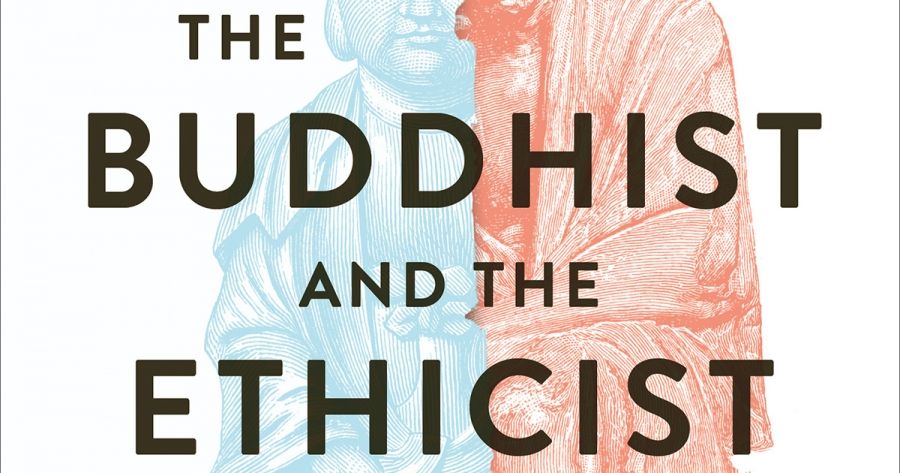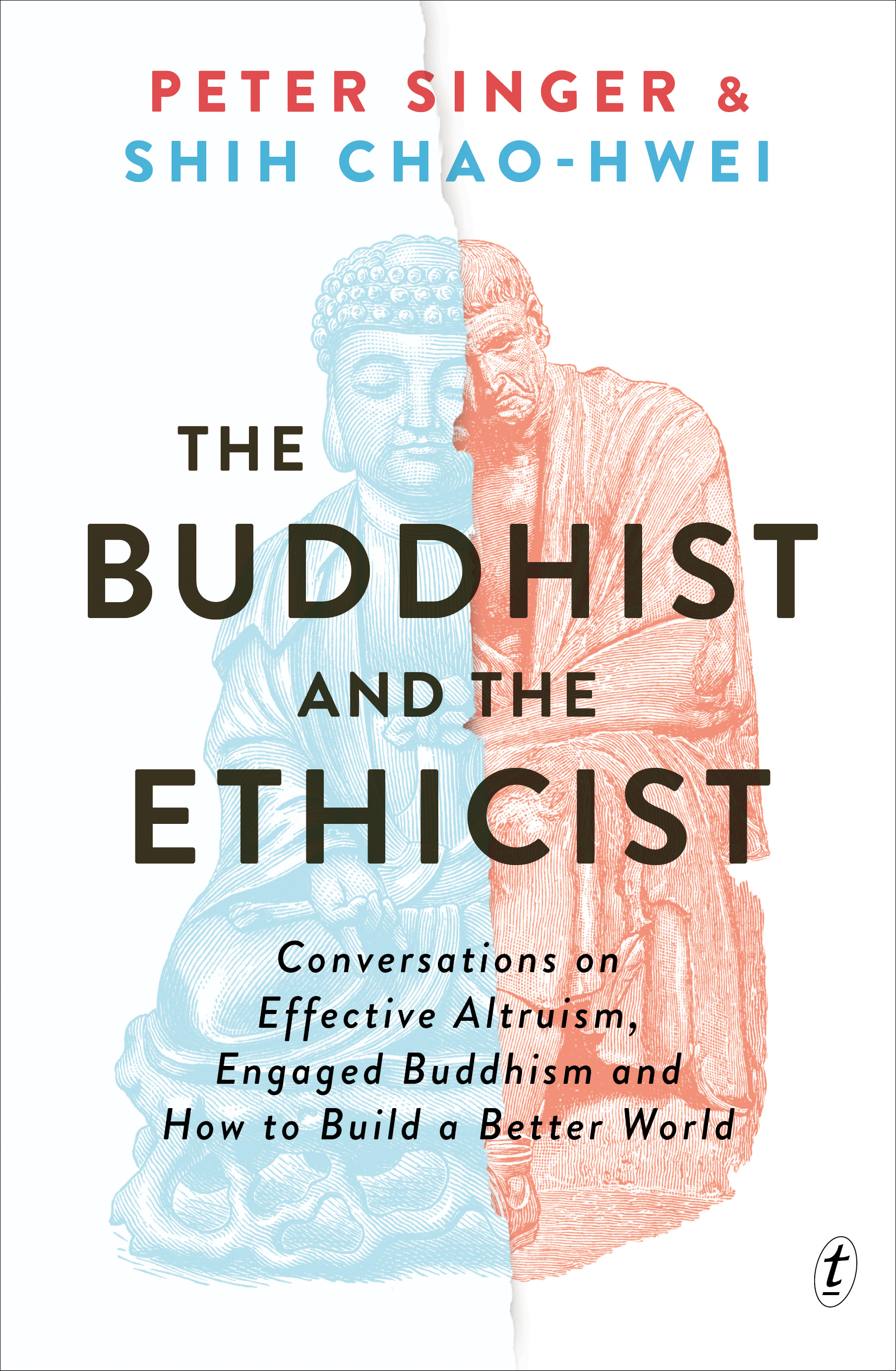
- Free Article: No
- Contents Category: Philosophy
- Review Article: Yes
- Article Title: Pain and suffering
- Article Subtitle: Two thinkers in conversation
- Online Only: No
- Custom Highlight Text:
This volume brings together two highly credentialled thinkers about moral and ethical matters: Peter Singer, the Ira W. DeCamp Professor of Bioethics at Princeton University, and Venerable Shih Chao-Hwei, a Taiwanese Buddhist nun, founder of the animal welfare organisation the Life Conservation Association and the Buddhist Hong-Shi College, as well as a lecturer at Hsuan Chuang University.
- Featured Image (400px * 250px):

- Alt Tag (Featured Image): Adam Bowles reviews ‘The Buddhist and the Ethicist: Conversations on effective altruism, engaged Buddhism, and how to build a better world’ by Peter Singer and Shih Chao-Hwei
- Book 1 Title: The Buddhist and the Ethicist
- Book 1 Subtitle: Conversations on effective altruism, engaged Buddhism, and how to build a better world
- Book 1 Biblio: Text Publishing, $36.99 pb, 256 pp
- Book 1 Cover Small (400 x 600):

- Book 1 Cover (800 x 1200):

The Buddhist and the Ethicist presents as a series of conversations that took place in 2016 at a monastery in Taiwan. The book, however, incorporates subsequent interactions over the next five years. This may account for its varying styles, since some parts read more formally than others; it may also account for one passage that leans heavily on Wikipedia, which we can perhaps overlook as a careless editorial inclusion. Singer illustrates his points with hypotheticals or ‘provocations’, while Chao-Hwei typically illustrates hers with stories from the Buddhist canon or her own experience. The tone is friendly, and each accords the other great respect, even when disagreeing. The pair, after all, share several common interests, not least strong convictions about alleviating the pain and suffering of sentient beings.
The book has nine chapters, mostly even in size, apart from the rather too long fifth chapter on embryo research and abortion. The first two chapters lay the groundwork for ethics and key Buddhist concepts. The remaining chapters concern gender equality, sexuality, animal welfare, euthanasia and suicide, and the death penalty and killing in war.
In the terms of Western ethical categories, Singer’s ethics are consequentialist, emphasising the outcome of an act in assessing its ethical merit. To anticipate this outcome, he resorts to an implicit mathematical futurism, without appearing to attempt (at least here) the mathematical formulation. This is a common critique of utilitarianism. If we were all to become vegetarians or vegans, how do we anticipate the consequences in terms of the collective good of living beings? For her part, Chao-Hwei’s ethics are deontological, emphasising intentionality and informed by the normative tradition of Buddhist thought, though she at times rejects norms she doesn’t like, such as women’s monastic rules, which express a distrust of and are designed to control women’s ‘dangerous’ sexuality.
But there is another, more profound point of difference between the two. Both Singer and Chao-Hwei wish to ameliorate the suffering produced through objective relations, i.e. the suffering or pain that might be inflicted on another. Only Chao-Hwei, however, is concerned with pain and suffering as a subjective experience that one must subjectively attend to through psychological management. It is unclear if Singer or Chao-Hwei recognises this second difference, though it simmers continually under the surface and occasionally bubbles over.
A case in point is in the chapter on sexuality. Singer queries Chao-Hwei’s commitments to ‘liberation from sex’, construing the phrase in the context of sexual mores and repression. There are plenty of examples of such things in Buddhism, but this is not what Chao-Hwei means. Rather, sex represents ‘desire’ or ‘thirst’, which leads to suffering due to our holding on to things and experiences as if they can be permanent sources of pleasure and fulfilment. Liberation from sex, therefore, addresses two related Buddhist concerns: first, that the ultimate aim of Buddhism is to alleviate suffering once and for all (suffering and pain, in this sense, are fundamentally existential and unavoidable, and their cessation, as the formula goes, is nirvana); second, that individual subjects are responsible for alleviating their own suffering (not just others’) by cultivating productive psychological habits towards desires and attachments (i.e., controlling and diminishing them and developing a deep awareness of the impermanence of these experiences and their objects).
Singer doesn’t believe in ultimate ends. Nor does his ethics appear to be much concerned with the psychology of suffering, which, for most forms of intellectual Buddhism, is fundamental to identifying it and curing it. To this extent, at least, Singer’s and Chao-Hwei’s ideas of suffering and pain are not quite the same.
Embryology reveals another fault line. For Singer, the key thresholds for determining the ethical merit of acts directed to other living things are those beings’ capacity to feel pain and to have consciousness (which are corollaries of each other). For consciousness, an elusive and hardly universal notion, he relies on a modern scientific understanding of the embryo, according to which it has no capacity to feel or experience consciousness until after sixteen weeks. For Singer, an embryo before this time is not a sentient being, since it is incapable of consciousness and feeling, which informs the moral circumstances of abortion or the use of embryos for medical research. Chao-Hwei has strong reservations about this reasoning. In Buddhist terms, an embryo is the next life of a being that had a prior existence. If it has no feeling or consciousness now (a point she was also reluctant to concede), it did so in its previous life. Killing a living thing terminates its opportunities to eliminate its suffering – again, this is because Buddhist conceptions of suffering include its subjective experience, not just suffering as a product of objective relations. For Chao-Hwei, the potential of a living thing to become sentient in its lifetime is an important consideration when such a being might be harmed. She often referred in such contexts to an ‘instinct for survival’, though I shared Singer’s confusion on this point. Sentience for Singer is a condition for moral consideration only in the immediate moment; the past or future sentience of a living thing does not condition the morality of harm done to it.
If rather too long and repetitive, this is a stimulating volume which raises important questions. It is at its most interesting when the points of contention between the interlocutors reveal the tensions stoked by their – perhaps incommensurable – presuppositions. But the volume also shows that agreement on many substantive issues can be reached, despite such incommensurabilities.


Comments powered by CComment